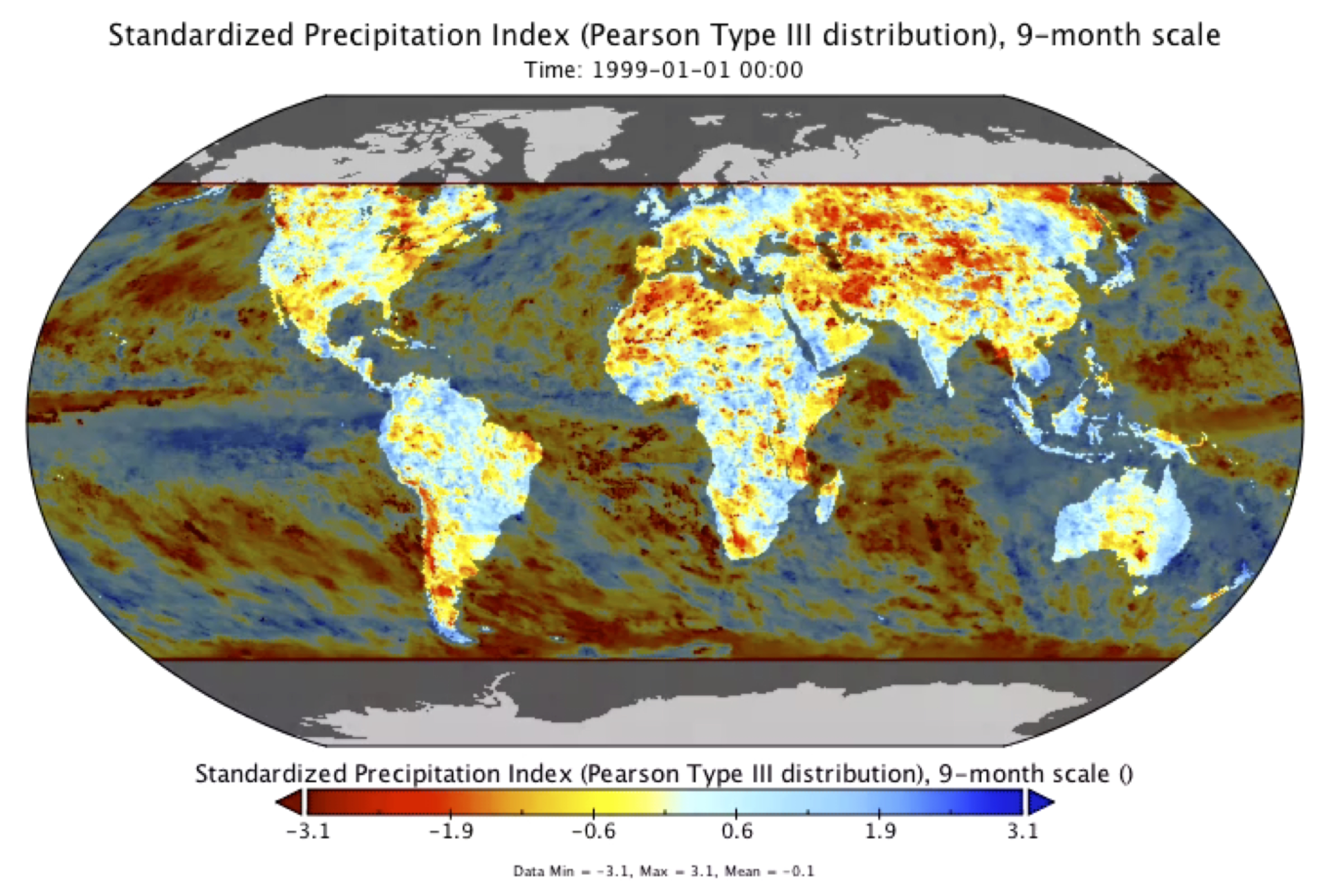climate_indices
Climate indices for drought monitoring

climate_indices
Python library of indices useful for climate monitoring
This project contains Python implementations of various climate index algorithms which provide a geographical and temporal picture of the severity and duration of precipitation and temperature anomalies useful for climate monitoring and research.
The following indices are provided:
- SPI, Standardized Precipitation Index, utilizing both gamma and Pearson Type III distributions
- SPEI, Standardized Precipitation Evapotranspiration Index, utilizing both gamma and Pearson Type III distributions
- PET, Potential Evapotranspiration, utilizing either Thornthwaite or Hargreaves equations
- PNP, Percentage of Normal Precipitation
- PCI, Precipitation Concentration Index
This Python implementation of the above climate index algorithms is being developed with the following goals in mind:
- to provide an open source software package to compute a suite of climate indices commonly used for climate monitoring, with well documented code that is faithful to the relevant literature and which produces scientifically verifiable results
- to provide a central, open location for participation and collaboration for researchers, developers, and users of climate indices
- to facilitate standardization and consensus on best-of-breed climate index algorithms and corresponding compliant implementations in Python
- to provide transparency into the operational code used for climate monitoring activities at NCEI/NOAA, and consequent reproducibility of published datasets computed from this package
- to incorporate modern software engineering principles and scientific programming best practices
This is a developmental/forked version of code that was originally developed by NIDIS/NCEI/NOAA. See drought.gov.
Supported Python Versions
| Python Version | Status | Notes |
|---|---|---|
| 3.10 | Supported | Minimum supported version |
| 3.11 | Supported | |
| 3.12 | Supported | |
| 3.13 | Supported | Latest supported version |
All versions are tested on Linux (ubuntu-latest). Python 3.10 and 3.13 are additionally tested on macOS. Both latest and minimum declared dependency versions are tested in CI.
Version Support Policy
This project provides 12 months notice before dropping support for a Python version. When a version approaches end-of-life, removal will be announced via the CHANGELOG and a GitHub issue, and implemented no sooner than 12 months after announcement with a version bump.
Python 3.9 support was dropped in v2.2.0 (August 2025) due to scipy>=1.15.3 requiring 3.10+.
API Stability
| API Surface | Status | Guarantee |
|---|---|---|
NumPy array functions (indices.spi, indices.spei, indices.pet) |
Stable | No breaking changes in minor versions |
xarray DataArray functions (spi(), spei(), pet_thornthwaite(), pet_hargreaves()) |
Beta | No breaking changes in patch versions |
Stable API: The NumPy-based computation functions follow strict semantic versioning.
Beta API: The xarray adapter layer provides automatic parameter inference, coordinate
preservation, CF metadata, and Dask support. While beta, computation results are identical
to the stable NumPy API — only the interface surface (parameter names, metadata attributes,
coordinate handling) may evolve. Beta features are tagged with BetaFeatureWarning and
marked in docstrings.
Migration Guide for v2.2.0
Breaking Change: Exception-Based Error Handling
Version 2.2.0 introduces a significant architectural improvement in error handling. The library now uses exception-based error handling instead of returning None tuples for error conditions.
What Changed
Before (v2.1.x and earlier):
# Old behavior - functions returned None tuples on failure
result = some_internal_function(data)
if result == (None, None, None, None):
# Handle error case
pass
After (v2.2.0+):
# New behavior - functions raise specific exceptions
try:
result = some_internal_function(data)
except climate_indices.compute.InsufficientDataError as e:
# Handle insufficient data case
print(f"Not enough data: {e.non_zero_count} values found, {e.required_count} required")
except climate_indices.compute.PearsonFittingError as e:
# Handle fitting failure case
print(f"Fitting failed: {e}")
New Exception Hierarchy
DistributionFittingError(base class)InsufficientDataError- raised when there are too few non-zero values for statistical fittingPearsonFittingError- raised when L-moments calculation fails for Pearson Type III distribution
Impact on Users
- Direct API users: No changes needed - the public SPI/SPEI functions handle exceptions internally
- Library integrators: If you were checking for
Nonereturn values from internal functions, update to use try/catch blocks - Benefits: More informative error messages, better debugging, and automatic fallback from Pearson to Gamma distribution when appropriate
Code Quality Improvements
Version 2.2.0 also addresses floating point comparison issues (python:S1244) throughout the codebase:
Floating Point Comparisons:
# ❌ OLD: Direct equality checks (unreliable)
if values == 0.0:
handle_zero_case()
# ✅ NEW: Safe comparison using numpy.isclose()
if np.isclose(values, 0.0, atol=1e-8):
handle_zero_case()
Benefits:
- Eliminates floating point precision issues in statistical parameter validation
- Improves test reliability and numerical robustness
- Follows scientific computing best practices for floating point arithmetic
- See
docs/floating_point_best_practices.mdfor comprehensive guidelines
Citation
You can cite climate_indices in your projects and research papers via the BibTeX
entry below.
@misc {climate_indices,
author = "James Adams",
title = "climate_indices, an open source Python library providing reference implementations of commonly used climate indices",
url = "https://github.com/monocongo/climate_indices",
month = "may",
year = "2017--"
}

